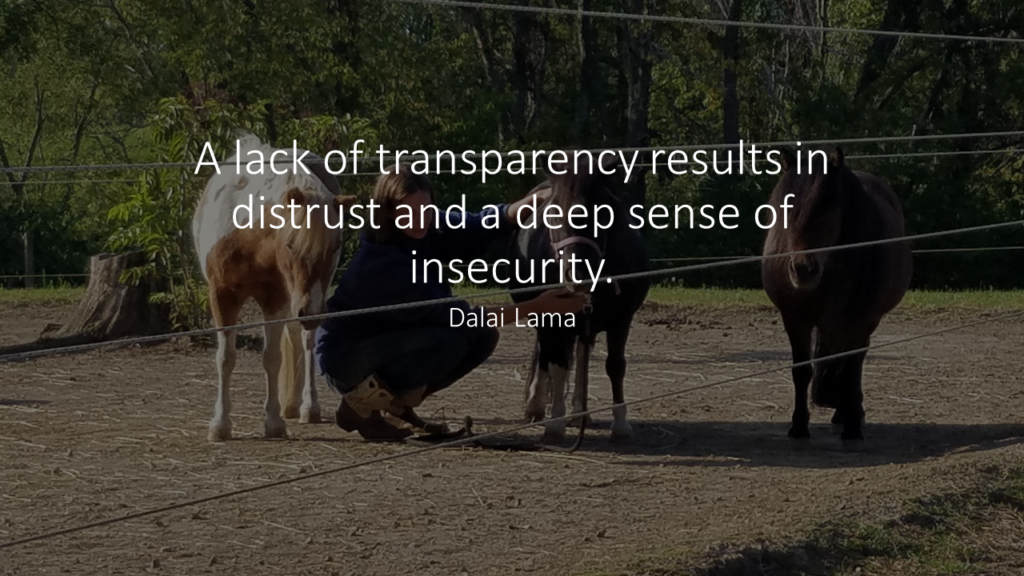
Think about a time when someone kept information from you in order to control a situation. It happens everyday in organizations of every kind – for profit and non-profit. Withholding information is not always bad – there are times when leaders must refrain from sharing sensitive information with their team in order to protect the organization or at least until a solution can be found. As with all things, it is the intention behind withholding the information that determines its effect.
When the intention behind withholding information is genuinely based on the fact that doing so is best for the organization as a whole at that time, then it is likely that the person or persons withholding the information recognize that it is necessary in order to protect the organization as a whole. Usually in this case, the information is merely withheld until a solution can be formulated that will reduce the chance of other consequences that could potentially arise at the information being shared. If the intention behind withholding information is for personal gain or power, then it becomes a situation that is going to erode trust.
For example, if a company finds out that there is a problem with their product, they may withhold making that information public until they determine the source of the problem and have a solution to fix the problem. The leadership team understands that making the information public without having more information available puts the company at risk. While team members who do not receive the information immediately may feel slighted in some way initially, once they realize that the information will be shared when more information is gathered and a solution is available, they likely will jump on board in ensuring that minimal damage is done to the company as a result of the problem.
On the other side of the intention spectrum, if the intention behind withholding the information regarding an issue with the product is so that someone doesn’t lose his or her job or so that they can somehow use that information to control others in the company, that is predatory intention.
So what is predatory intention? Simply stated, it’s when our intention in a situation is purely for our own gain, regardless of the consequences of our actions.
In the leadership and team development work I do with horses as co-facilitators, intention is a key factor in participants being able to engage the horses in the ground-based exercises that we do. While one may say that their intention is for the right reason, if that is not true (as in their intention is actually for some personal gain only- usually power and control) then the horse picks up on that incongruence in communication and responds by not engaging with the participant. Horses are experts at picking up on predatory intention – they have to be as their lives literally depend on it. I find that we as humans often pick up on predatory intention but we ignore our “gut feeling” because we have been conditioned to convince ourselves that we are overreacting. Horses don’t have that luxury but that’s precisely the reason they are so good at calling out our true intention in any given interaction.
So what do you do when your gut feeling is that someone’s intention in an interaction is predatory?
- Don’t ignore the insight you have. Pay attention to it. But don’t act on it until you do some information gathering to determine the facts of the situation.
- Talk to others who may be able to offer insight and help you to not react immediately to your gut feeling.
- Reflect on why you might have this gut feeling and whether that is truly the case. Is the person you are thinking has predatory intentions someone that you have had issues with previously? Have those issues been resolved or are they still lingering? Has the person exhibited predatory intentions before in other situations?
- Work to gather factual information about the situation and consider reasons that the person may be withholding information. Does that person have something to gain personally from withholding the information? If not, what are other reasons he/she may be withholding information at this point in time?
Anytime we are interacting with other people we are paying attention to what we think their intentions are in our interaction. And we should pay attention if we get a “vibe” that someone’s intentions are predatory (self-serving). But we also need to think about whether there is some other belief that may be steering us to think their intentions are predatory and take time to gather facts before we confront that person or call them out on their true intentions in the situation.
Interacting with horses will bring out predatory intention in someone very quickly and give that person the opportunity to address it and change their behavior. Predatory intention in a leader or on a team can be devastating to an organization and needs to be addressed in order to prevent unnecessary problems from arising.
Next time you are faced with not sharing information, think about your intention behind that decision. If doing so will help the organization in some way, make sure you have a plan for when and how to share the information at some point. If it is purely self-serving, consider the long-term consequences of your actions on others (and yourself). Because predators don’t always walk away unscathed.
